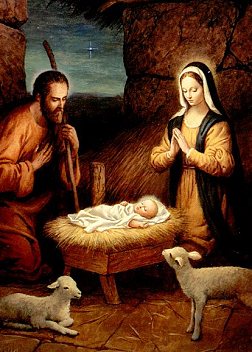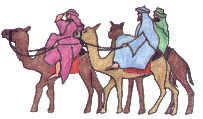
The requested URL was not found on this server.

Home Catechism Reflections/2000 RCIA Church Doctrine Church Documents Mysticism Chat Prayer Prayer Requests Discussion Saints Social Doctrine Bible (NAB) Links |
 The Nativity (cont.)
The Nativity (cont.)by--Lisa Marie Phillips About that time Caesar Augustus made a decree that there would be a census taken. It was the law at that time that the men should go to the homes of their ancestry. These census happened every 14 years. They were to assess taxes and find out who the eligible men were to join the service. The Jews were exempt from service, but the taxes had to be assessed. So since Joseph was from the tribe of Judah he had to go to the home of the tribe which was Bethlehem because it was the city of David. But when they got there all the lodging available in town had already been taken and there was no place for them. An innkeeper let them use a cave which was used as the stable. Mary gave birth to her son there. He was wrapped in strips of cloth, also known as swaddling cloths, and laid in the manger where the grasses for the animals were kept. While people might not have noticed His birth, the inhabitants of heaven had. An angel appeared to shepherds in the fields. Once again began with do not be afraid. He told them about the birth of their savior in Bethlehem. Why shepherds? They were the outcasts. The orthodox jews would not have anything to do with them. They could not observe all the ceremonial cleansing rites that others could. Perhaps it was because Jesus would later be identified as a shepherd (1 Peter 5:4), perhaps because He was the Lamb of God (John 1:29), perhaps it was because these shepherds might have been the ones who tended the lambs who were sacrificed at the temple, and perhaps it was because they were common people for whom Christ came. Who knows: But isn�t it interesting to ponder? It was also a custom that when a boy was born the local musicians would play some soft music. Being where they were this could not happen either. So the angels in heaven sang to him instead. Eight days after his birth Jesus was circumcised and named. Also according to Jewish law the mother was unclean for 40 days after the birth of a son. If it were a girl she was unclean for 80 days. During that time the mother could not enter the temple. After that period of time she would have to take an offering to the temple. Usually that offering asked for was a lamb for a burnt offering and a pigeon for a sin offering. But if they were poor they could substitute two pigeons which was what Mary brought. These were ceremonies to offer the child to God. There was there at the temple a man named Simeon. He had been told by the Holy spirit that he would not die before he had seen the Savior. He took Jesus into his arms and praising God he said ��Master, now you are dismissing your servant in peace, according to your word; for my eyes have seen your salvation, which you have prepared in the presence of all peoples,�� (Luke 2:29-30) Many Jews thought that they would be rulers of the world and that God would send a King from heaven, who would take over the world. But God sent a baby by a virgin. Mary must have pondered a lot these things that Simeon said to her. ��This child is destined for the falling and the rising of many in Israel, and to be a sign that will be opposed so that the inner thoughts of many will be revealed and a sword will pierce your own soul too.��(Luke 2:34-35). Right after seeing Simeon they came upon another prophetess named Anna. �She came, and began to praise God and to speak about the child to all who were looking for the redemption of Jerusalem.�(Luke 2:38) Jesus did not come with flashing neon signs telling of his coming. He had only a  star. There were some wise men star. There were some wise menLisa Marie Phillips �copyright 2000 Lisa Marie Phillips All rights reserved. No portion of this article may be used without the express written permission from the author. Magazine continued next page. CLICK HERE |
�2000 eCatholic/2000
all rights
reserved